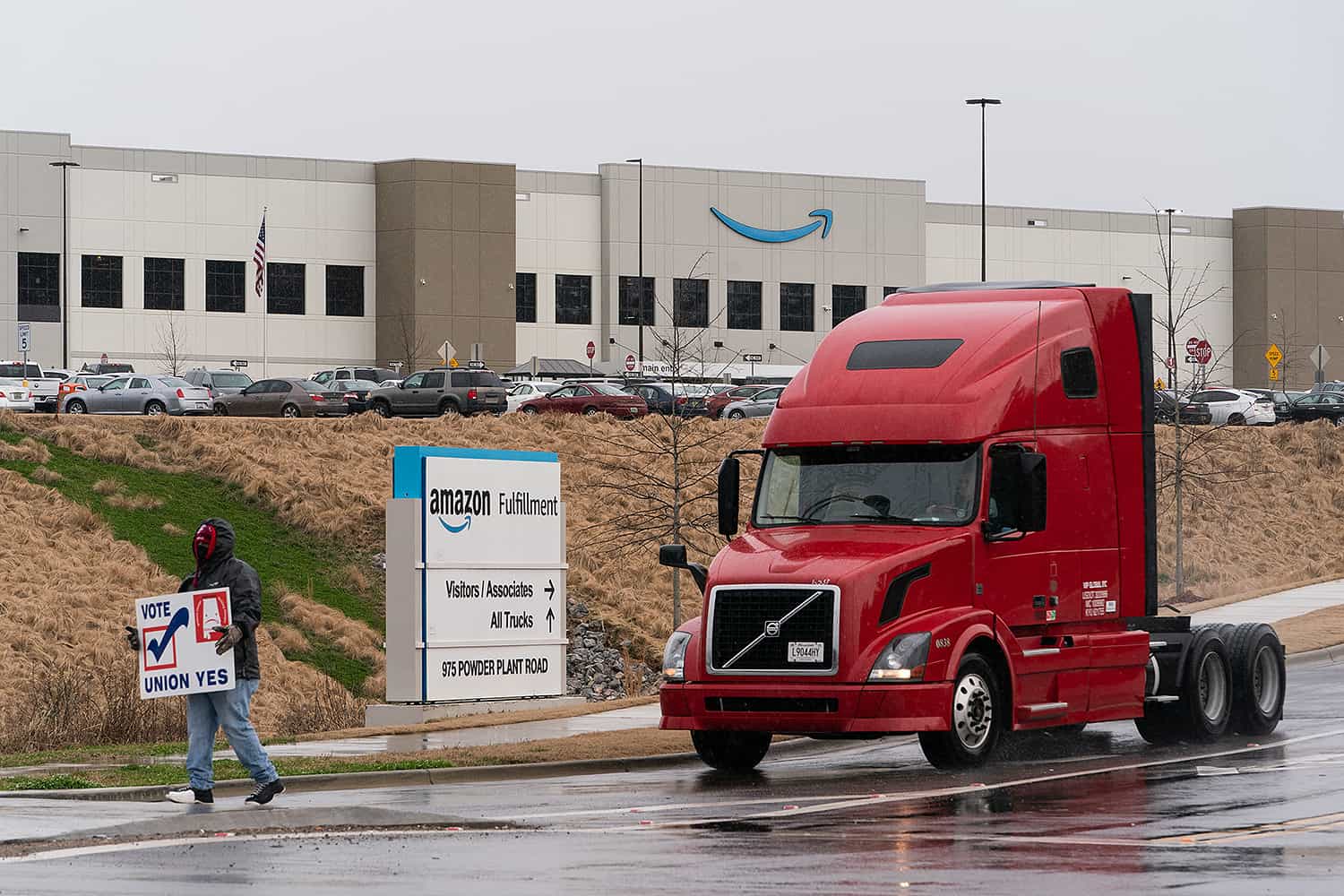
Zachary Boullt is a student at Harvard Law School.
The New York Times has documented the expansive reach and attention that the Amazon union drive in Bessemer has received across the country. The article first focuses on the prevalence of high-profile politicians and celebrities that have weighed in, including NFL players, Stacey Abrams, Danny Glover, Tina Fey, Senator Sanders, and President Biden. The article also serves as a summation of Amazon’s anti-union tactics across the campaign, including workplace signs, direct texts and emails, required captive audience sessions, traffic light manipulation, and the timing of its annual severance offer. It highlights how the union drive has become symbolic of the plight of low-wage employees and workers of color across the country. OnLabor’s Professor Ben Sachs is quoted in the piece, who highlights the significance of a potential union victory and advocates for labor law reform to stop company interference with the union drive. In other Amazon union drive news, a Congressional delegation including Andy Levin, Jamaal Bowman, Cori Bush, Terri Sewell, and Nikema Williams is traveling to Alabama on Friday to support the unionization effort.
Apart from the Bessemer union drive, Amazon is also in the news after a coalition of labor groups and local politicians rallied on Monday at a developing distribution center in North Andover to improve worker safety and to staff the development with more union labor. Areas of particular focus include environmental concerns and COVID-19 outbreaks. Amazon defended itself by saying that it already offers what is being demanded, but its defense amounts to bare assertions of its “industry-leading pay, comprehensive benefits, and opportunities for career growth” that take place in a “safe, modern, and inclusive work environment.” The rally is particular noteworthy in Massachusetts, as Amazon has been expanding its distribution presence in the state at the same time as Eastern Massachusetts municipalities have been passing resolutions urging higher labor standards from the company.
The Seattle Education Association, a teachers union, has filed unfair labor practice complaints against Seattle Public Schools for reopening some classrooms and bringing back teachers before the two parties reached a reopening agreement. The filed complaints were based in state law and filed on behalf of teachers, paraeducators, and office staffers. The Seattle School Board used a clause in the contract with the teachers union to designate around 700 educators as “essential” in order to bring them back to the classroom. The main complaint of the teachers union is that the two sides had not yet agreed on safety protocols, jeopardizing the safety of the returning teachers and staff.
A group of Democratic House Committee chairs sent a letter to President Biden on Monday asking that he require N95 air filtration masks through OSHA for meatpacking plants, prisons, and other risky workplaces. The N95 masks filter out about 95% of small air particles, mitigating virus spread. A spokeswoman for the North American Meat Institute said the administration should focus on vaccine distribution, not masks.






Daily News & Commentary
Start your day with our roundup of the latest labor developments. See all
January 16
The NLRB publishes its first decision since regaining a quorum; Minneapolis labor unions call for a general strike in response to the ICE killing of Renee Good; federal workers rally in DC to show support for the Protecting America’s Workforce Act.
January 15
New investigation into the Secretary of Labor; New Jersey bill to protect child content creators; NIOSH reinstates hundreds of employees.
January 14
The Supreme Court will not review its opt-in test in ADEA cases in an age discrimination and federal wage law violation case; the Fifth Circuit rules that a jury will determine whether Enterprise Products unfairly terminated a Black truck driver; and an employee at Berry Global Inc. will receive a trial after being fired for requesting medical leave for a disability-related injury.
January 13
15,000 New York City nurses go on strike; First Circuit rules against ferry employees challenging a COVID-19 vaccine mandate; New York lawmakers propose amendments to Trapped at Work Act.
January 12
Changes to EEOC voting procedures; workers tell SCOTUS to pass on collective action cases; Mamdani's plans for NYC wages.
January 11
Colorado unions revive push for pro-organizing bill, December’s jobs report shows an economic slowdown, and the NLRB begins handing down new decisions